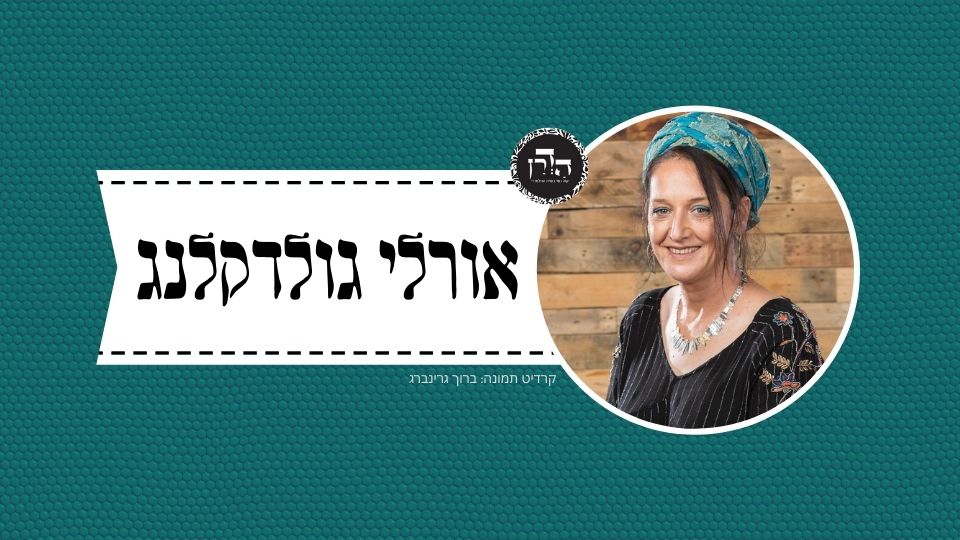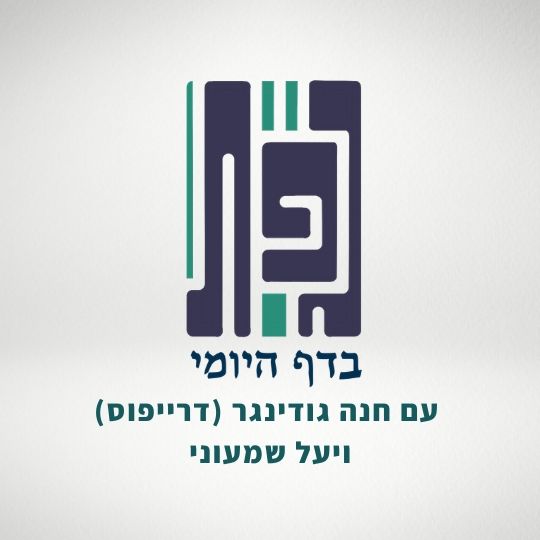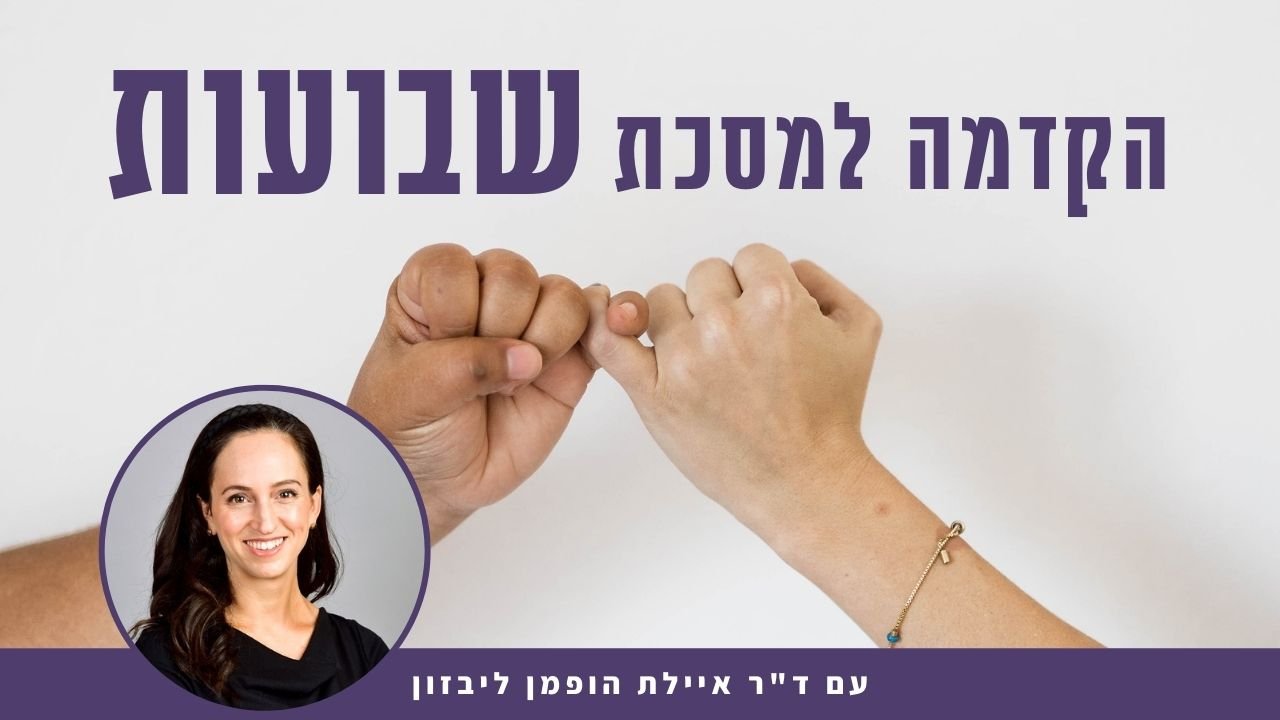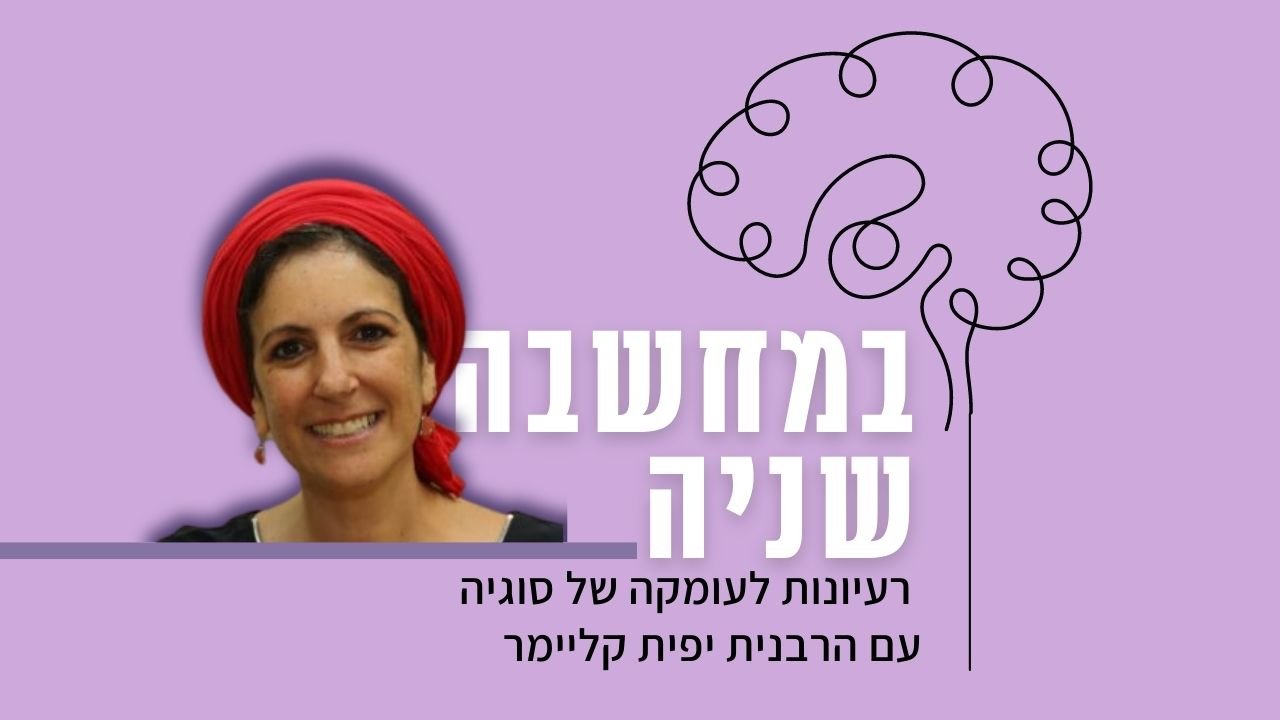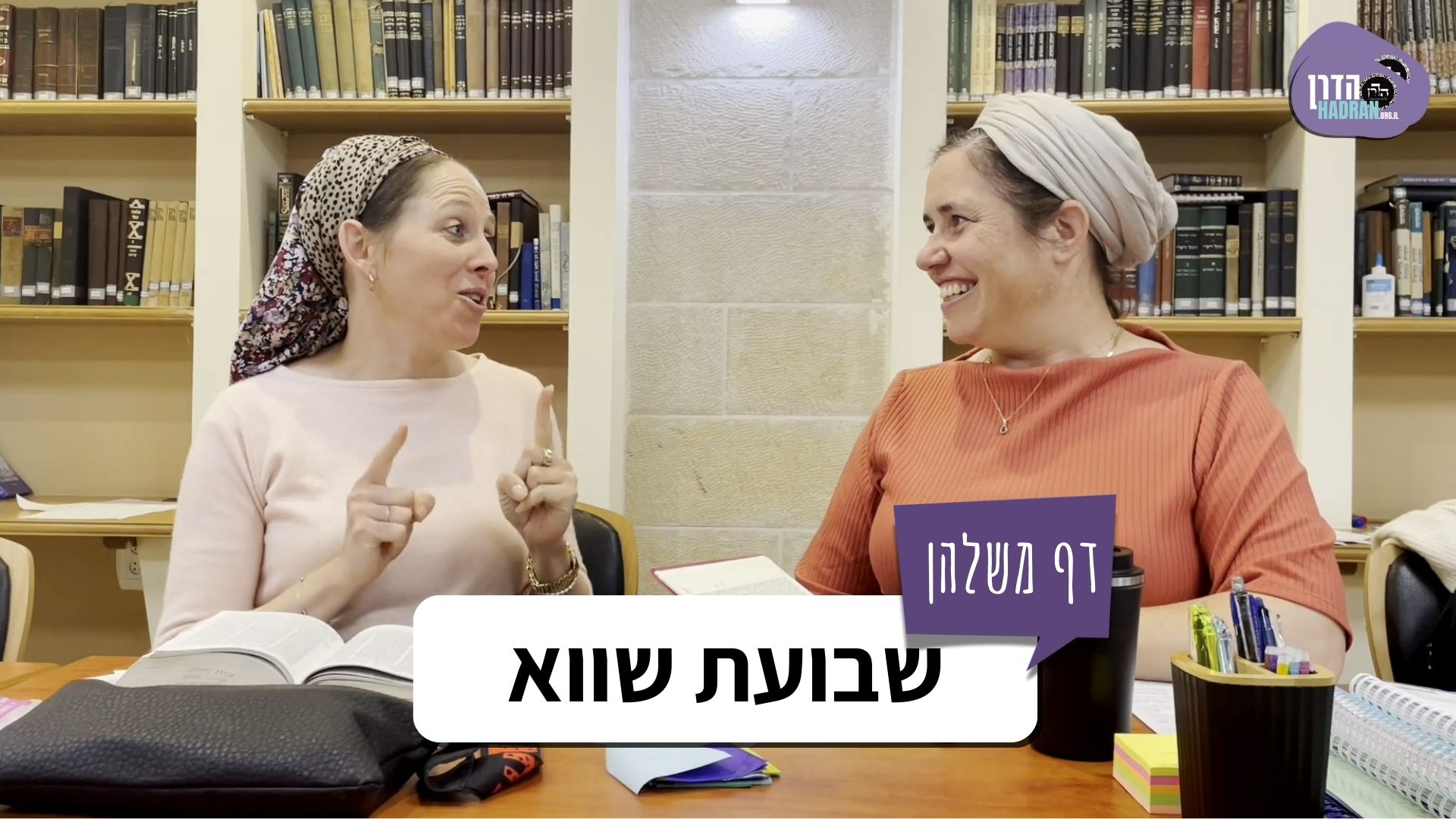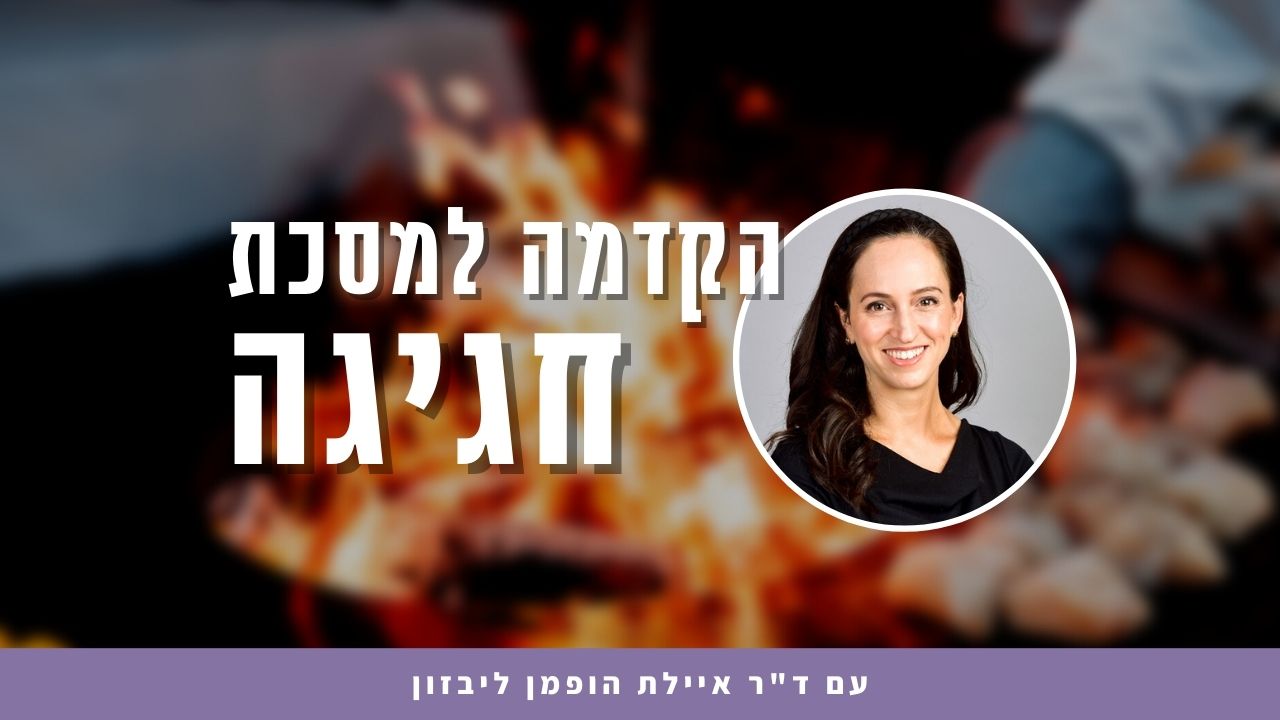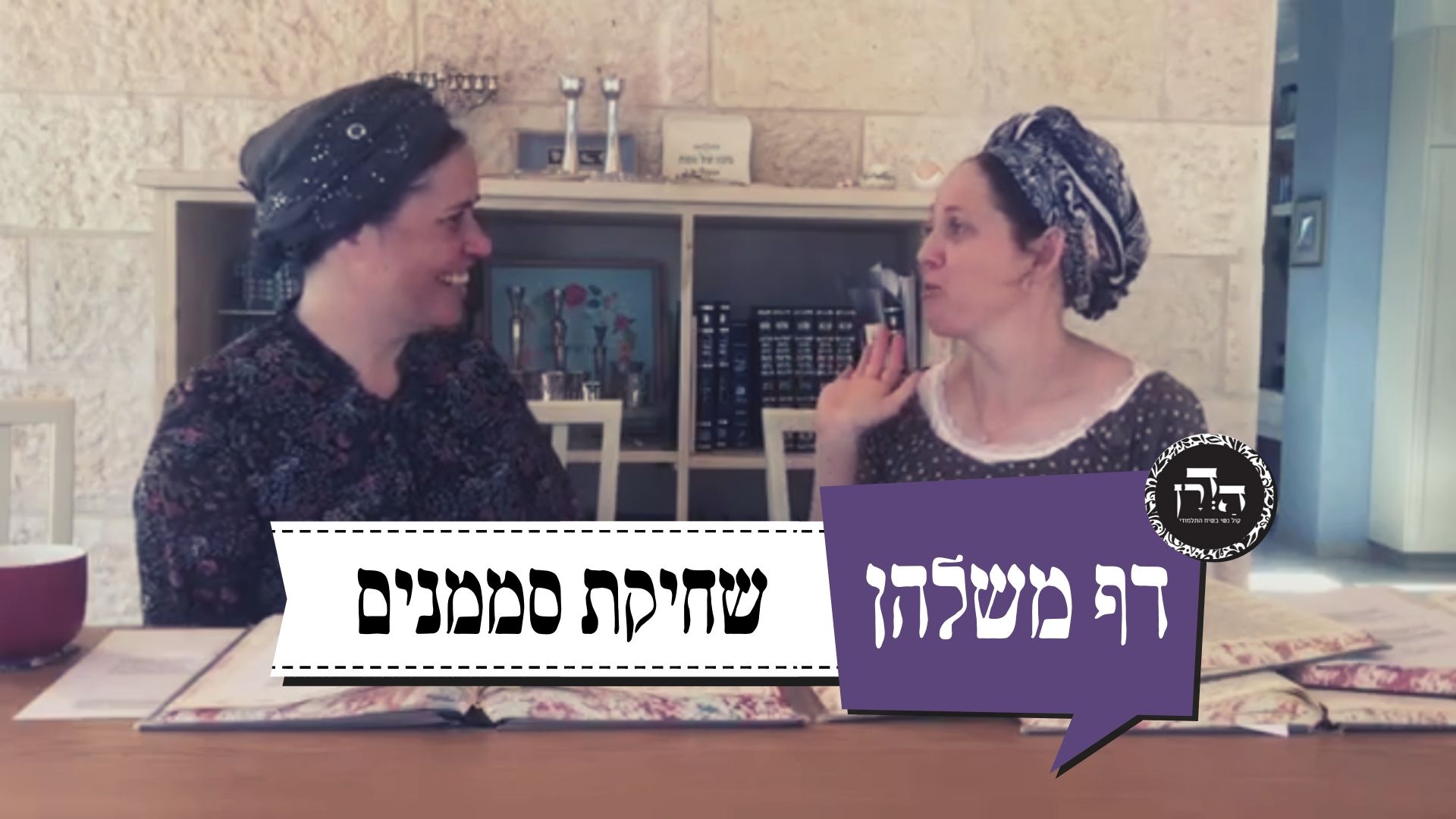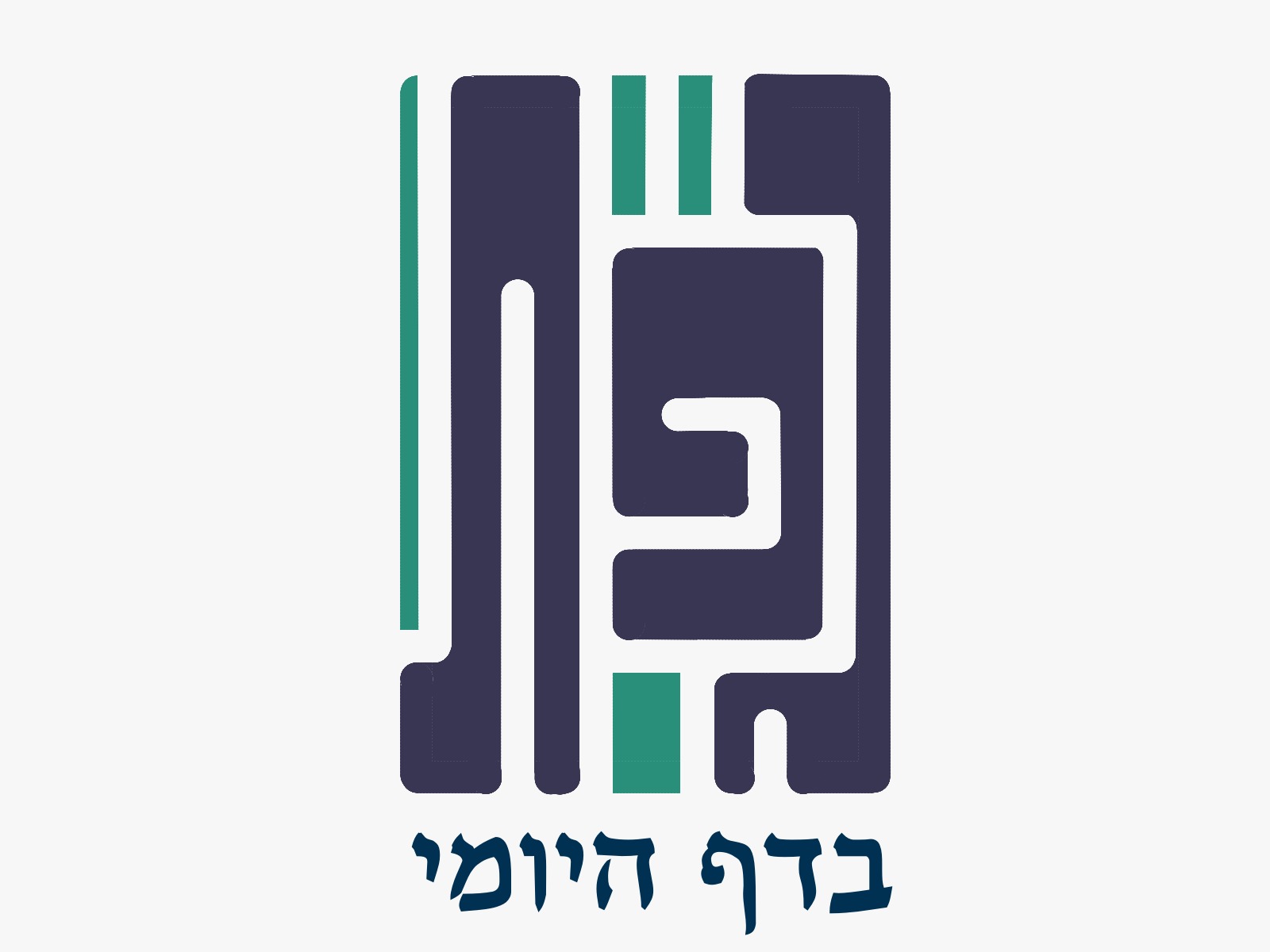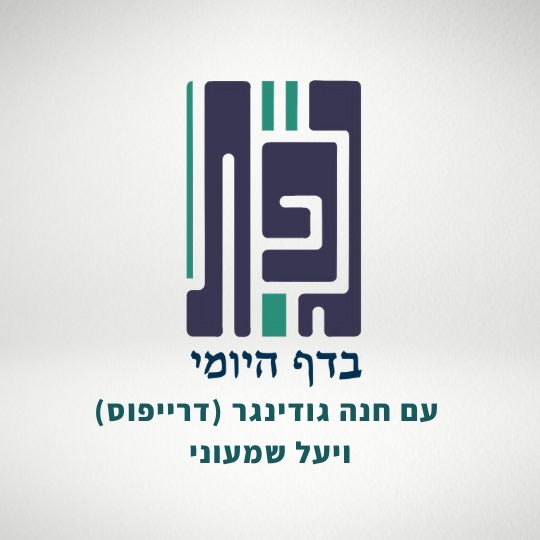מה ההבדלים בקדושה שיש בין בהמה עם מום שמקדישים למזבח (קדושת דמים) לבין בהמה שמקדישים ואז נופל בו מום – פסולי המוקדשים (קדושת הגוף)? מהם הדינים לגבי פדיונם? מהם הדינים לפני פדיון?
הלימוד השבוע מוקדש לזכות ולשלום הַיְימׇנוֹט אֱמוּנָה בַּת באנצ’י (קָסָאוּ) בת 11 שנעלמה במקום מגוריה בצפת, לפני שנתיים, ביום ט”ז אדר תשפ”ד (25.2.24), ולא נודעו עקבותיה.
הלימוד השבוע מוקדש למען ביטחון המדינה, החיילים והאזרחים, ולמען חירותו של העם האיראני. שנזכה בקרוב שיתקיים בנו הפסוק: "לַיְּהוּדִים הָיְתָה אוֹרָה וְשִׂמְחָה וְשָׂשֹׂן וִיקָר”.
רוצה להקדיש שיעור?

כלים
הלימוד השבוע מוקדש לזכות ולשלום הַיְימׇנוֹט אֱמוּנָה בַּת באנצ’י (קָסָאוּ) בת 11 שנעלמה במקום מגוריה בצפת, לפני שנתיים, ביום ט”ז אדר תשפ”ד (25.2.24), ולא נודעו עקבותיה.
הלימוד השבוע מוקדש למען ביטחון המדינה, החיילים והאזרחים, ולמען חירותו של העם האיראני. שנזכה בקרוב שיתקיים בנו הפסוק: "לַיְּהוּדִים הָיְתָה אוֹרָה וְשִׂמְחָה וְשָׂשֹׂן וִיקָר”.
כלים
העמקה
רוצה להבין מה באמת קורה מתחת לפני השטח של הסוגיה?
שיעורים, פודקאסטים והרחבות של מיטב המורות שלנו יפתחו לך עוד זוויות וכיווני חשיבה.
חדשה בלימוד הגמרא?
זה הדף הראשון שלך? איזו התרגשות עצומה! יש לנו בדיוק את התכנים והכלים שיעזרו לך לעשות את הצעדים הראשונים ללמידה בקצב וברמה שלך, כך תוכלי להרגיש בנוח גם בתוך הסוגיות המורכבות ומאתגרות.
פסיפס הלומדות שלנו
גלי את קהילת הלומדות שלנו, מגוון נשים, רקעים וסיפורים. כולן חלק מתנועה ומסע מרגש ועוצמתי.
בכורות יד
מַתְנִי׳ כׇּל הַקֳּדָשִׁים שֶׁקָּדַם מוּם קָבוּעַ לְהֶקְדֵּשָׁן וְנִפְדּוּ — חַיָּיבִין בַּבְּכוֹרָה וּבַמַּתָּנוֹת, וְיוֹצְאִין לְחוּלִּין לִיגָּזֵז וְלֵיעָבֵד, וְלָדָן וַחֲלָבָן מוּתָּר לְאַחַר פִּדְיוֹנָן.
MISHNA: All sacrificial animals in which a permanent blemish preceded their consecration do not assume inherent sanctity and only their value is consecrated, and once they were redeemed, they are obligated in the mitzva of a firstborn, i.e., their offspring are subject to being counted a firstborn, and in the priestly gifts of the foreleg, the jaw, and the maw, and they can emerge from their sacred status and assume complete non-sacred status in order to be shorn and to be utilized for labor. And their offspring and their milk are permitted after their redemption.
וְהַשּׁוֹחֲטָן בַּחוּץ פָּטוּר, וְאֵין עוֹשִׂין תְּמוּרָה, וְאִם מֵתוּ — יִפָּדוּ, חוּץ מִן הַבְּכוֹר וּמִן הַמַּעֲשֵׂר.
And one who slaughters them outside the Temple courtyard is exempt from karet, and those animals do not render an animal that was a substitute for them consecrated. And if these animals died before they were redeemed, they may be redeemed and fed to dogs, and they do not require burial, except for the firstborn and the animal tithe. With regard to these two types of offerings, even if they were blemished before they became consecrated they assume inherent sanctity, like other offerings that were consecrated and subsequently became blemished.
וְכׇל שֶׁקָּדַם הֶקְדֵּשָׁן אֶת מוּמָן, אוֹ מוּם עוֹבֵר לְהֶקְדֵּשָׁן, וּלְאַחַר מִכָּאן נוֹלַד לָהֶן מוּם קָבוּעַ לְהֶקְדֵּשָׁן וְנִפְדּוּ — פְּטוּרִין מִן הַבְּכוֹרָה וּמִן הַמַּתָּנוֹת, וְאֵינָן יוֹצְאִין לְחוּלִּין לִיגָּזֵז וְלֵיעָבֵד.
And all sacrificial animals whose consecration preceded their blemish, or who had a temporary blemish prior to their consecration and afterward developed a permanent blemish and they were redeemed, they are exempt from, i.e., their offspring are not counted, a firstborn, and from the gifts of the foreleg, the jaw, and the maw, and they do not completely emerge from their sacred status and assume non-sacred status in order to be shorn and to be utilized for labor.
וְלָדָן וַחֲלָבָן אָסוּר לְאַחַר פִּדְיוֹנָן, וְהַשּׁוֹחֲטָן בַּחוּץ חַיָּיב, וְעוֹשִׂין תְּמוּרָה, וְאִם מֵתוּ — יִקָּבֵרוּ.
And their offspring, which were conceived prior to redemption, and their milk, are prohibited after their redemption. And one who slaughters them outside the Temple courtyard is liable to receive karet, and those animals render an animal that was a substitute for them consecrated. And if these animals died before they were redeemed, they may not be redeemed and fed to dogs; rather, they must be buried.
גְּמָ׳ טַעְמָא דְּנִפְדּוּ, הָא לֹא נִפְדּוּ — פְּטוּרִין מִן הַבְּכוֹרָה וּמִן הַמַּתָּנוֹת. קָסָבַר: קְדוּשַּׁת דָּמִים מְדַחָה מִן הַבְּכוֹרָה וּמִן הַמַּתָּנוֹת.
GEMARA: The mishna teaches that all animals that were blemished prior to their consecration are subject to their offspring being counted a firstborn and to the obligation of the gifts once they have been redeemed. The Gemara infers: The reason that they are subject to the obligations of a firstborn and the gifts is that they were redeemed. But if they were not redeemed, they are exempt from their offspring being counted a firstborn and from the obligation of the priestly gifts. The Gemara comments: This indicates that the tanna of the mishna holds: Sanctity that inheres in an animal’s value defers, i.e., renders it exempt, from the mitzva of the firstborn and from the gifts.
וְיוֹצְאִין לְחוּלִּין וְכוּ׳. טַעְמָא דְּנִפְדּוּ, הָא לֹא נִפְדּוּ — אֲסִירִי בְּגִיזָּה וַעֲבוֹדָה. מְסַיַּיע לֵיהּ לְרַבִּי אֱלִיעֶזֶר, דְּאָמַר: קׇדְשֵׁי בֶּדֶק הַבַּיִת אֲסוּרִין בְּגִיזָּה וַעֲבוֹדָה?
§ The mishna further teaches: And they can emerge from their sacred status and assume complete non-sacred status in order to be shorn and to be utilized for labor. The Gemara infers: The reason they become non-sacred is that they were redeemed. But if they were not redeemed, they remain sacred and are prohibited with regard to shearing and labor. The Gemara notes: This supports the opinion of Rabbi Eliezer, who says: Animals consecrated for the Temple maintenance are prohibited with regard to shearing and labor. Since animals consecrated for the Temple maintenance are equivalent to animals that possess sanctity that inheres in their value, the mishna supports Rabbi Eliezer’s opinion.
אָמְרִי: לָא, קְדוּשַּׁת דָּמִים לַמִּזְבֵּחַ הוּא דְּמִיחַלְּפָא בִּקְדוּשַּׁת הַגּוּף לַמִּזְבֵּחַ, גְּזַרוּ בְּהוּ רַבָּנַן, אֲבָל קׇדְשֵׁי בֶּדֶק הַבַּיִת — לָא.
The Gemara rejects this suggestion: The Sages said: No; the mishna does not necessarily support the opinion of Rabbi Eliezer. It is possible that it is only with regard to an animal that has sanctity that inheres in its value and that was consecrated for the altar, which can be mistakenly exchanged with an animal that possesses inherent sanctity and was likewise consecrated for the altar, that the Sages decreed that it is prohibited to shear it and perform labor with it, due to a concern that one might confuse it with an animal that possesses inherent sanctity and ultimately violate a Torah prohibition. But with regard to animals consecrated for the Temple maintenance, no such decree was issued, as this concern does not apply.
וְלָדָן וַחֲלָבָן מוּתָּר כּוּ׳. הֵיכִי דָמֵי? אִילֵּימָא דְּאִיעַבַּר וְאִתְיְלִיד לְאַחַר פִּדְיוֹנָן — פְּשִׁיטָא, חוּלִּין נִינְהוּ! אֶלָּא דְּאִיעַבַּר לִפְנֵי פִּדְיוֹנָן, וְאִתְיְלִיד לְאַחַר פִּדְיוֹנָן.
§ The mishna teaches that their offspring and their milk are permitted after their redemption. The Gemara asks: What are the circumstances of the case of the mishna, in which the offspring of blemished redeemed animals are permitted? If we say that the mishna is referring to a case where the animals became pregnant and gave birth after their redemption, then it is obvious that the offspring are permitted, as they are non-sacred animals from the moment of conception. Rather, it must be referring to a case where they became pregnant before their redemption, and gave birth after their redemption, and the mishna is teaching that the offspring are permitted despite the fact they were conceived while their mothers were consecrated.
הָא לִפְנֵי פִּדְיוֹנָן — אֲסִירִי.
The Gemara infers from this ruling: But if the animals gave birth before their redemption, the offspring are prohibited until they are redeemed.
נִפְדִּין תְּמִימִים אוֹ אֵין נִפְדִּין תְּמִימִין?
The halakha is that the offspring of an animal that possesses inherent sanctity is born sanctified, and therefore it cannot be redeemed until it develops a blemish. The Gemara asks: With regard to the offspring of an animal that possesses sanctity that inheres in its value, are they redeemed unblemished, or are they not redeemed unblemished? In other words, can they be redeemed immediately, or must one wait until they develop a blemish?
תָּא שְׁמַע: הַמַּתְפִּיס בַּעֲלֵי מוּמִין קְבוּעִין לְגַבֵּי מִזְבֵּחַ, וְיָלְדוּ — יִמָּכְרוּ, וְאֵין צְרִיכִין מוּם, שֶׁאֵין קְדוּשָּׁה חָלָה עֲלֵיהֶן, שֶׁלֹּא יְהֵא טָפֵל חָמוּר מִן הָעִיקָּר.
The Gemara suggests: Come and hear a proof from a baraita: With regard to one who dedicates permanently blemished animals for the altar, and those animals gave birth, their offspring may be sold in order to be redeemed and they do not require a blemish to render their sale permitted. The reason is that they are not imbued with sanctity, and that the subsidiary sanctity of the offspring should not be more stringent than the primary sanctity of the mother. Since the blemished mother can be redeemed without delay, the same applies to its offspring. This proves that the offspring of animals that possess sanctity that inheres in their value may be redeemed.
טַעְמָא, שֶׁלֹּא יְהֵא טָפֵל חָמוּר מִן הָעִיקָּר, אֲבָל הִקְדִּישׁ זָכָר לְדָמָיו — קָדוֹשׁ קְדוּשַּׁת הַגּוּף. מְסַיַּיע לֵיהּ לְרָבָא, דְּאָמַר רָבָא: הִקְדִּישׁ זָכָר לְדָמָיו — קָדוֹשׁ קְדוּשַּׁת הַגּוּף.
The Gemara notes: The reason that the baraita rules that the sanctity for the altar does not take effect is that the subsidiary sanctity should not be more stringent than the primary sanctity, i.e., the only reason it is not sanctified for the altar is because its sanctity is derived from its mother, which cannot be sanctified for the altar as it is blemished. But if one consecrated an unblemished male animal for its value, where there is no secondary consecration, it is sanctified with inherent sanctity. The Gemara adds that this supports the opinion of Rava, as Rava says: If one consecrated a male animal for its value, it is sanctified with inherent sanctity.
וְהַשּׁוֹחֲטָן בַּחוּץ פָּטוּר. רַבִּי אֶלְעָזָר מַתְנֵי ״חַיָּיב״, וּמוֹקֵי לַהּ בְּבָמַת יָחִיד.
§ The mishna teaches with regard to animals whose blemish preceded their consecration: And one who slaughters them outside the Temple courtyard is exempt. The Gemara notes that Rabbi Elazar teaches the mishna as follows: And one who slaughters them outside the Temple courtyard is liable, and he interprets the mishna as referring to a case of a private altar of an individual. In other words, the mishna is not teaching that one is liable to receive karet for slaughtering an animal outside the Temple courtyard, but that he is liable to receive lashes for sacrificing a blemished animal upon a private altar.
דְּאָמַר רַבִּי אֶלְעָזָר: מִנַּיִן לַזּוֹבֵחַ בְּהֵמָה בַּעֲלַת מוּם בְּבָמַת יָחִיד בִּשְׁעַת הֶיתֵּר הַבָּמוֹת, שֶׁהוּא בְּלֹא תַעֲשֶׂה? שֶׁנֶּאֱמַר: ״לֹא תִזְבַּח לַה׳ אֱלֹהֶיךָ שׁוֹר וָשֶׂה״, אִם אֵינוֹ עִנְיָן לְבָמָה גְּדוֹלָה, דִּכְתִיב: ״עַוֶּרֶת אוֹ שָׁבוּר וְגוֹ׳״, תְּנֵהוּ עִנְיָן לְבָמַת יָחִיד.
As Rabbi Elazar says: From where is it derived that one who slaughters a blemished animal upon a private altar of an individual at a time when private altars are permitted is in violation of a prohibition? It is derived from a verse, as it is stated: “You shall not sacrifice to the Lord an ox, or a sheep, in which is a blemish” (Deuteronomy 17:1). If this verse is not referring to the matter of a great public altar, since that halakha is derived from a different verse, as it is written: “Blind or broken…you shall not sacrifice these unto the Lord” (Leviticus 22:22), apply the verse in Deuteronomy to the matter of a private altar of an individual.
אֵימָא: אִם אֵינוֹ עִנְיָן לְקָדָשִׁים — תְּנֵהוּ עִנְיָן לִבְכוֹר, סָלְקָא דַּעְתָּךְ אָמֵינָא: הוֹאִיל וְקָדוֹשׁ כְּשֶׁהוּא בַּעַל מוּם — לִיקְרַב נָמֵי כְּשֶׁהוּא בַּעַל מוּם, קָא מַשְׁמַע לַן דְּלָא!
The Gemara raises an objection: But one can say with regard to the verse in Deuteronomy: If this verse is not referring to the matter of regular sacrificial animals, which is derived from the verse in Leviticus, apply it to the matter of a firstborn, as it might enter your mind to say: Since a firstborn animal is sanctified even when it is a permanently blemished animal, let it also be sacrificed upon the altar when it is a blemished animal. The verse in Deuteronomy would therefore teach us that this is not the halakha, i.e., a blemished firstborn animal may not be sacrificed upon the altar. What, then, is the reason that the halakha of a private altar of an individual, rather than the halakha of firstborn animals, is derived from the verse in Deuteronomy?
אָמְרִי: בְּכוֹר בְּהֶדְיָא כְּתִיב בֵּיהּ ״פִּסֵּחַ אוֹ עִוֵּר לֹא תִזְבָּחֶנּוּ״.
The Sages said in explanation: Concerning a firstborn, the halakha is written explicitly with regard to it: “Every firstborn…if there be any blemish therein, lameness, or blindness…you shall not sacrifice it” (Deuteronomy 15:19–21). Consequently, the verse in Deuteronomy, chapter 17, cannot be referring to the halakha that a firstborn animal may not be sacrificed upon the altar, as that is already taught in chapter 15.
וְאֵימָא: אִם אֵינוֹ עִנְיָן לְקָדָשִׁים — תְּנֵהוּ עִנְיָן לְמַעֲשֵׂר, דְּסָלְקָא דַּעְתָּךְ אָמֵינָא: הוֹאִיל וְקָדוֹשׁ בְּמוּמוֹ, דִּכְתִיב: ״לֹא יְבַקֵּר בֵּין טוֹב לָרַע״, נִקְרַב נָמֵי בְּמוּמֵיהּ, קָא מַשְׁמַע לַן דְּלָא!
The Gemara inquires: But still, one can say: If the verse in chapter 17 is not referring to the matter of sacrificial animals, which is derived from the verse in Leviticus, apply it to the matter of the animal tithe, as it might enter your mind to say: Since a tithed animal is sacred even with its blemish, as it is written: “He shall not inquire whether it be good or bad” (Leviticus 27:33), let it also be sacrificed with its blemish. The verse in Deuteronomy (17:1) would therefore teach us that this is not the halakha, i.e., a blemished tithed animal may not be sacrificed upon the altar.
אָמְרִי: מַעֲשֵׂר נָמֵי גָּמַר ״הַעֲבָרָה״ ״הַעֲבָרָה״ מִבְּכוֹר.
The Sages said in response: With regard to the animal tithe as well, it is unnecessary for the verse to teach this halakha, as it is derived from a verbal analogy between the word: Passing, mentioned with regard to tithed animals (see Leviticus 27:32), and passing mentioned with regard to the firstborn (see Exodus 13:12). Just as a blemished firstborn animal is not sacrificed upon the altar, so too, a blemished tithed animal is not sacrificed upon the altar.
אֵימָא: תְּנֵהוּ עִנְיָן לִתְמוּרַת קָדָשִׁים, דְּסָלְקָא דַּעְתָּךְ אָמֵינָא: הוֹאִיל וּקְדוֹשָׁה כְּשֶׁהִיא בַּעֲלַת מוּם, דִּכְתִיב: ״לֹא יַחֲלִיפֶנּוּ וְלֹא יָמִיר אוֹתוֹ וְגוֹ׳״, קָרֵיבָה נָמֵי כְּשֶׁהִיא בַּעֲלַת מוּם, קָא מַשְׁמַע לַן דְּלָא!
The Gemara persists: But say that one should apply Deuteronomy 17:1 to the matter of animals substituted for sacrificial animals, as it might enter your mind to say: Since a substitute becomes sacred even when it is blemished, as it is written: “He shall not exchange it, nor substitute it, a good for a bad, or a bad for a good; and if he shall at all substitute animal for animal, then both it and that for which it is substituted shall be holy” (Leviticus 27:10), it may likewise be sacrificed when it is blemished. The verse in Deuteronomy would therefore teach us that this is not the halakha, as a blemished substitute cannot be sacrificed upon the altar.
אָמַר קְרָא: ״וְהָיָה הוּא וּתְמוּרָתוֹ״, מַקִּישׁ תְּמוּרָתוֹ לוֹ — מָה הוּא בַּעַל מוּם לֹא, אַף תְּמוּרָתוֹ בַּעַל מוּם לֹא.
The Gemara answers: The halakha with regard to a substitute is already established, as the verse states: “It and that for which it is substituted shall be holy.” The verse compares a substitute to the consecrated animal for which it was substituted: Just as the consecrated animal is not sacrificed if it is blemished, so too, its substitute is not sacrificed if it is blemished.
מַתְקֵיף לַהּ רַבִּי זֵירָא: אֵימָא, תְּנֵהוּ עִנְיָן לְוַלְדוֹת קָדָשִׁים, דְּסָלְקָא דַּעְתָּךְ אָמֵינָא: הוֹאִיל וּקְדוֹשִׁין כְּשֶׁהֵן בַּעֲלֵי מוּמִין אַגַּב אִמָּן, כְּשֶׁהֵן בַּעֲלֵי מוּמִין נָמֵי קָרְבִי, קָא מַשְׁמַע לַן דְּלָא!
The Gemara presents a final objection: Rabbi Zeira objects to the claim that Deuteronomy 17:1 should be understood as referring to a private altar of an individual. Say instead that one should apply it to the matter of the offspring of sacrificial animals, as it could enter your mind to say: Since they are sacred even when they are blemished, on account of their mother, they may also be sacrificed when they are blemished. Deuteronomy 17:1 would therefore teach us that this is not the halakha.
אָמַר רָבָא: כְּבָר פַּסְקַהּ תַּנָּא דְּבֵי רַבִּי יִשְׁמָעֵאל, דְּתָנָא דְּבֵי רַבִּי יִשְׁמָעֵאל: ״רַק קָדָשֶׁיךָ אֲשֶׁר יִהְיוּ לְךָ וּנְדָרֶיךָ״ — ״רַק קָדָשֶׁיךָ״ אֵלּוּ הַתְּמוּרוֹת, ״אֲשֶׁר יִהְיוּ לְךָ״ אֵלּוּ הַוְּולָדוֹת, ״וּנְדָרֶיךָ״ — הִקִּישָׁן הַכָּתוּב לְנֶדֶר, מָה נֶדֶר בַּעַל מוּם לֹא, אַף הָנֵי נָמֵי בַּעַל מוּם לֹא.
Rava says in response: The tanna of the school of Rabbi Yishmael has already ruled that the blemished offspring of sacrificial animals cannot be sacrificed upon the altar, from a different verse. As the school of Rabbi Yishmael taught: The verse states: “Only your sacred items which you have, and your vows, you shall take, and go to the place which the Lord shall choose” (Deuteronomy 12:26). “Only your sacred items”; these are the substitutes. “Which you have”; these are the offspring. When it states: “And your vows,” the verse thereby juxtaposes animal substitutes and offspring with an animal consecrated by a vow, teaching that just as an animal consecrated by a vow is not sacrificed if it is blemished, so too, these are also not sacrificed if they are blemished. Accordingly, Deuteronomy 17:1 must be understood as referring to a private altar of an individual, as maintained by Rabbi Elazar.
וְאֵין עוֹשִׂין תְּמוּרָה, מַאי טַעְמָא? דְּאָמַר קְרָא: ״לֹא יַחֲלִיפֶנּוּ וְלֹא יָמִיר וְגוֹ׳״. הַשְׁתָּא רַע בְּטוֹב אָמְרַתְּ לֹא, טוֹב בְּרָע מִיבַּעְיָא? אֶלָּא טוֹב מֵעִיקָּרוֹ עוֹשֶׂה תְּמוּרָה, רַע מֵעִיקָּרוֹ אֵין עוֹשֶׂה תְּמוּרָה.
§ The mishna teaches: And sacrificial animals whose blemish preceded their consecration do not render an animal that was a substitute for them sacred. The Gemara asks: What is the reason for this ruling? It is derived from a verse, as the verse states: “He shall not exchange it, nor substitute it, a good for a bad, or a bad for a good” (Leviticus 27:10). The Gemara infers: Now that you have said that substituting a bad animal for a good animal is not permitted, is it necessary to state that substituting a good animal for a bad animal is not permitted? Rather, the verse is teaching that an animal which is good at the outset renders an animal that was a subsitute for it sacred, but an animal that is bad at the outset, i.e., whose blemish preceded its consecration, does not render an animal that was a subsitute for it sacred.
אִם מֵתוּ יִפָּדוּ. אָמַר רַב יְהוּדָה אָמַר רַב: זוֹ דִּבְרֵי רַבִּי שִׁמְעוֹן, דְּאָמַר: קׇדְשֵׁי מִזְבֵּחַ הָיוּ בִּכְלַל הַעֲמָדָה וְהַעֲרָכָה, קׇדְשֵׁי בֶּדֶק הַבַּיִת לֹא הָיוּ בִּכְלַל הַעֲמָדָה וְהַעֲרָכָה.
§ The mishna further teaches: And if these animals died before they were redeemed, they may be redeemed and fed to dogs. Rav Yehuda says that Rav says: This is the statement of Rabbi Shimon, who says: Items consecrated to be sacrificed on the altar were included in the requirement of standing and valuation, but items with the sanctity of those consecrated for Temple maintenance, such as the red heifer, were not included in the requirement of standing and valuation. Since animals that were consecrated for the altar require standing and valuation in order to be redeemed, they cannot be redeemed after death, as it is no longer possible to stand them before the priest. Animals consecrated for the Temple maintenance, and likewise animals whose blemish preceded their consecration, do not require standing and valuation, and therefore they can be redeemed after death.
דִּתְנַן, רַבִּי שִׁמְעוֹן אוֹמֵר: קׇדְשֵׁי בֶּדֶק הַבַּיִת, אִם מֵתוּ — יִפָּדוּ. וּמוֹדֶה רַבִּי שִׁמְעוֹן בְּבַעַל מוּם מֵעִיקָּרוֹ שֶׁנִּפְדֶּה. מַאי טַעְמָא? דְּאָמַר קְרָא: ״אוֹתָהּ״ ״אוֹתָהּ״ — לְמַעוֹטֵי בַּעַל מוּם מֵעִיקָּרָא.
This is as we learned in a mishna (Temura 32a): Rabbi Shimon says: With regard to animals consecrated for the Temple maintenance, if they died they may be redeemed, because animals consecrated for the Temple maintenance are not included in the obligation of standing and valuation. And Rabbi Shimon concedes with regard to an animal that was blemished from the outset, i.e., before it was consecrated, that it may be redeemed even if it was consecrated for the altar. What is the reason? It is derived from a verse, as the verse states: “Then he shall stand the animal before the priest. And the priest shall appraise it” (Leviticus 27:11–12). The emphasis on “it” serves to exclude an animal that was blemished from the outset.
אֲבָל חֲכָמִים אוֹמְרִים: אִם מֵתוּ — יִקָּבֵרוּ. מַאן חֲכָמִים? תָּנָא דְּבֵי לֵוִי הוּא, דְּתָנָא דְּבֵי לֵוִי: הַכֹּל הָיוּ בִּכְלַל הַעֲמָדָה וְהַעֲרָכָה, וַאֲפִילּוּ בַּעַל מוּם מֵעִיקָּרוֹ.
But the Rabbis say: With regard to both animals consecrated for the altar and animals consecrated for Temple maintenance, if they died they must be buried. The Gemara asks: Whose opinion is that of the Rabbis in the mishna? It is the opinion of the tanna of the school of Levi, as the school of Levi taught: All animals were included in the obligation of standing and valuation, even an animal that was blemished from the outset.
וְכֵן תָּנָא דְּבֵי לֵוִי בְּמַתְנִיתֵיהּ: אֲפִילּוּ חַיָּה, אֲפִילּוּ עוֹף, וְהָכְתִיב ״אוֹתָהּ״! ״אוֹתָהּ״ לְתָנָא דְּבֵי לֵוִי קַשְׁיָא.
And similarly, the school of Levi taught in Levi’s own collection of baraitot: Even an undomesticated animal and even a bird are included in the obligation of standing and valuation, despite the fact that they can never be sacrificed upon the altar. The Gemara asks: But isn’t it written: “And the priest shall appraise it,” which is an expression of exclusion? If so, the verse must be excluding some case, at least that of an undomesticated animal or a bird. The Gemara concedes that the phrase “and the priest shall appraise it” is difficult according to the opinion of the tanna of the school of Levi.
אֲבָל רַבָּנַן דִּפְלִיגִי עֲלֵיהּ דְּרַבִּי שִׁמְעוֹן, מַאי? הָכִי נָמֵי דְּאִם מֵתוּ יִפָּדוּ? אִי הָכִי,
The Gemara asks: But in light of this difficulty, according to the Rabbis who disagree with Rabbi Shimon in the mishna in Temura, what is the halakha? Is it indeed so that if animals whose blemish preceded their consecration died they may be redeemed, as derived from the word “it”? If that is so, then why did Rav say: This is the statement of Rabbi Shimon?
